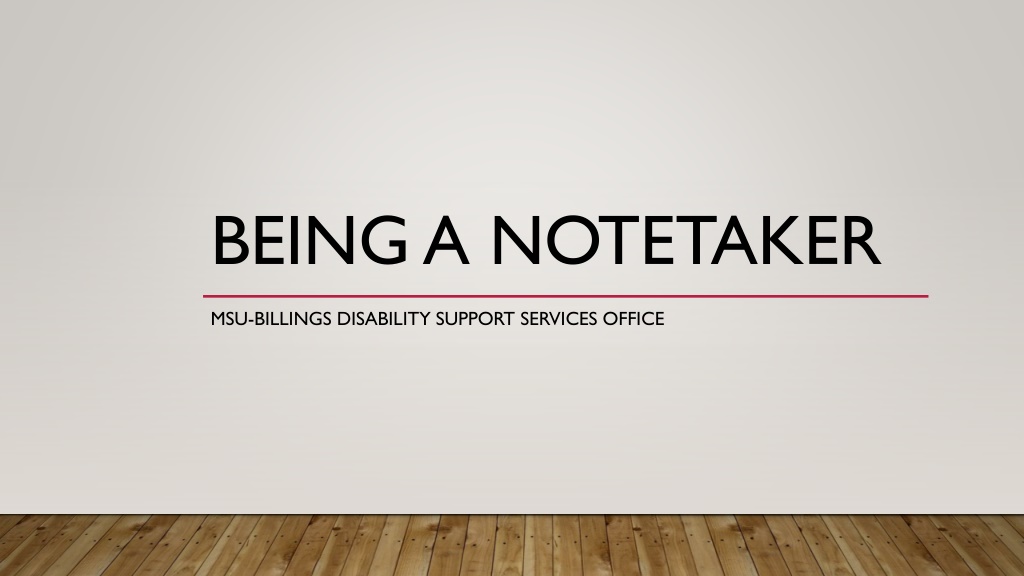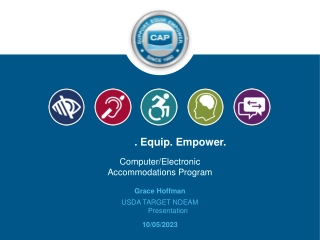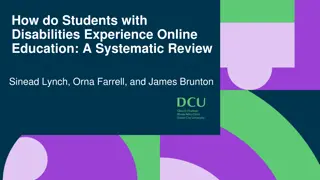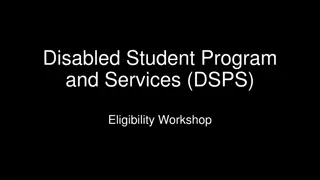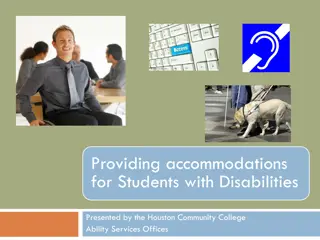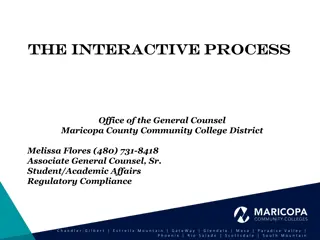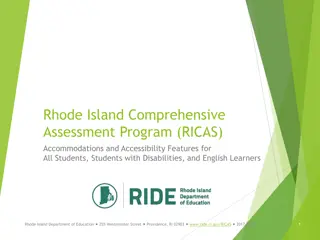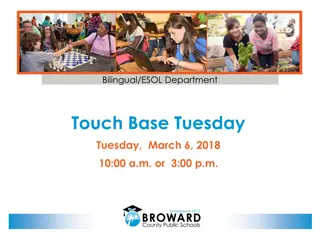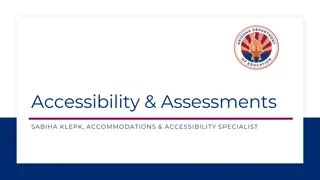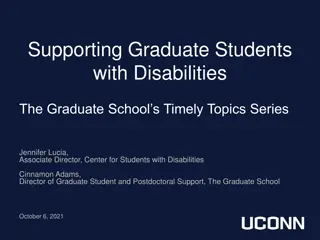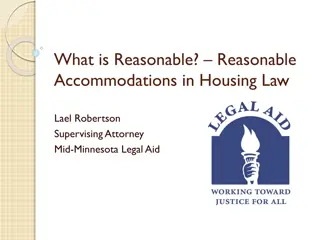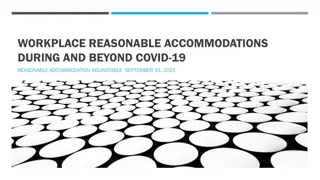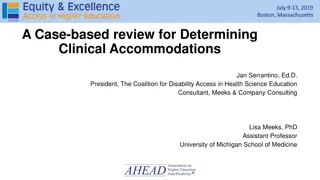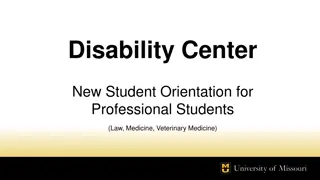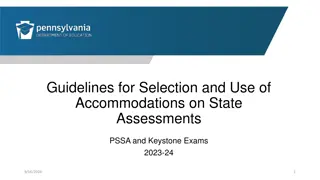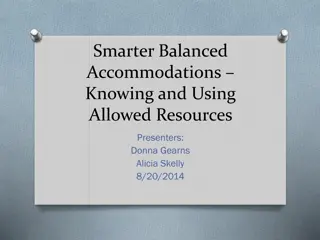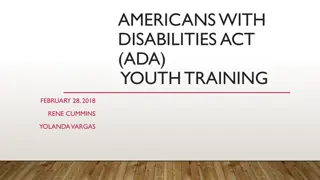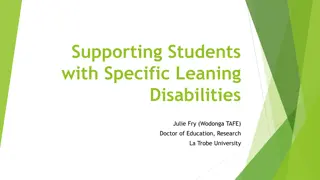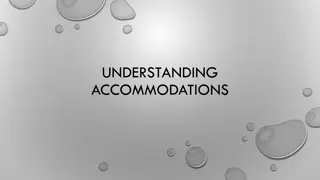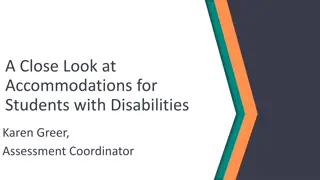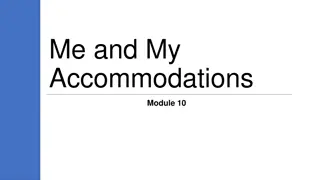Understanding Notetaking Accommodations for Students with Disabilities
Notetaking is a crucial accommodation provided by Disability Support Services (DSS) to ensure equal access for students with disabilities. Whether due to physical limitations, hearing impairments, or cognitive challenges, some students require assistance in taking notes during classes. This guide outlines the significance of notetakers, who may need this support, and how to provide notes on university and city college campuses. It also highlights the responsibilities of notetakers in maintaining confidentiality and delivering clear, legible notes to support their peers with disabilities.
- Notetaking accommodations
- Disability Support Services
- Students with disabilities
- Equal access
- Educational accommodations.
Download Presentation

Please find below an Image/Link to download the presentation.
The content on the website is provided AS IS for your information and personal use only. It may not be sold, licensed, or shared on other websites without obtaining consent from the author. Download presentation by click this link. If you encounter any issues during the download, it is possible that the publisher has removed the file from their server.
E N D
Presentation Transcript
BEING A NOTETAKER MSU-BILLINGS DISABILITY SUPPORT SERVICES OFFICE
WHY NOTETAKERS? Notetaking is an accommodation that Disability Support Services (DSS) provides to students with disabilities to ensure equal access under Section 504 of the Rehabilitation Act of 1973 and the American s with Disabilities Act of 1990 Students with disabilities may sometimes need a copy of peer notes because they cannot make their own copy. The reasons may be different depending on the disability. The examples on the next slide are generalized and do not include all reasons that DSS may grant students to ask for a notetaker.
WHO NEEDS A NOTETAKER? Deaf/Hard of Hearing- cannot watch an interpreter signing to them and write notes at the same time. Their eyes are their ears and need to be at the front of the classroom instead of at the paper. Autism Spectrum, ADHD, or Learning Disabilities (ex. Dyslexia)- may not be able to keep up with the lecture and writing notes at the same time. Also, may not be able to pull what ideas out of the lecture may be relevant to write down. Physical disabilities- may be unable to hold a pen for an extended period of time
HOW DO I PROVIDE NOTES? (UNIVERSITY CAMPUS) On the University campus: Bring your notes to the DSS office COE 135 and use the photo copier to make a copy of your notes for the student There is a bin of folders on the table in the DSS office. One should have the class name, professor and initials for the student receiving your notes. *if there is more than one DSS student receiving notes for the course, they will each have a folder and you will need to make multiple copies. If the student discusses a different way to receive notes (ex. email), please feel free to do whatever works for you and the DSS student. You may copy notes for DSS students who receive the accommodation at DSS
HOW DO I PROVIDE NOTES? (CITY COLLEGE CAMPUS) Bring your notes to the DSS Office, Tech Building Room A008. DSS staff will copy the notes and give you a copy. Please bring your notes to the DSS Office as soon as you are able. DSS students and notetakers may make alternate arrangements if both agree.
WHAT ARE MY RESPONSIBILITIES? BE IN CLASS. If you cannot be in the classroom, please try to let DSS know. See if you can get someone else to provide notes for the DSS student, or if the professor can get notes from a different student for the day. Provide clear, legible notes for the DSS student at least once or twice a week. It is preferable if the student can have the notes the day of the class like every other student in the classroom Must have notes in advance of exams to be able to study (not cram) Keep disability information confidential. If you know what student you are taking notes for, they may not want to be outed to any other peers that they are registered with DSS
WHAT ARE MY RESPONSIBILITIES? If you do not keep up with your notetaker responsibilities, DSS may assign a new notetaker If you have to drop the class that you are taking notes in, during any part of the semester, PLEASE notify DSS as soon as possible so that we can find a new notetaker
WHAT IS NOT MY RESPONSIBILITY? You are not signed up to be the DSS student s tutor, or provide anything to them but the notes You are not responsible for DSS student s success or grades You do not have to provide notes if you know that the DSS student was not in class, having a notetaker does not mean that they do not need to attend class. They will need to request notes for missed classes, just like any student who may be out for illness or personal reasons
HOW TO TAKE NOTES FOR OTHER STUDENTS We assume all volunteers take good notes since they felt able to help us provide this service, but sometimes taking notes for someone else is a little different than just notes for yourself. Please read through these ideas how to take notes for someone else! Use the date and course name at the beginning of each day s notes, this will help the student to organize their notes for your class and any other courses they take Numbering the pages also helps organization Write legibly, use print instead of cursive if possible. Some learning disabilities may have problems reading cursive. Typing notes is always accepted, but not required.
HOW TO TAKE NOTES FOR OTHER STUDENTS Write in dark ink so the photo copier can see writing on the page Make notes as to assignments/tests dates in your notes if they aren t listed or are changed from the syllabus Make sure your notes are conveying the main idea Don t put your opinions down in the notes, remain objective to what the professor lectures so that the student knows what the professor s ideas are, not yours For slideshows, the student can read what is on the slide, write down what the professor says that isn t written on a slide, note what slide the notes are from Completely write out the meaning of an abbreviation the first time you use it
BENEFITS TO YOU! $100 scholarship award applied to you by the Office of Community Involvement Taking notes for someone else helps you take better notes!
THANK YOU! Without your services we cannot provide notetaking accommodations to students with disabilities!
